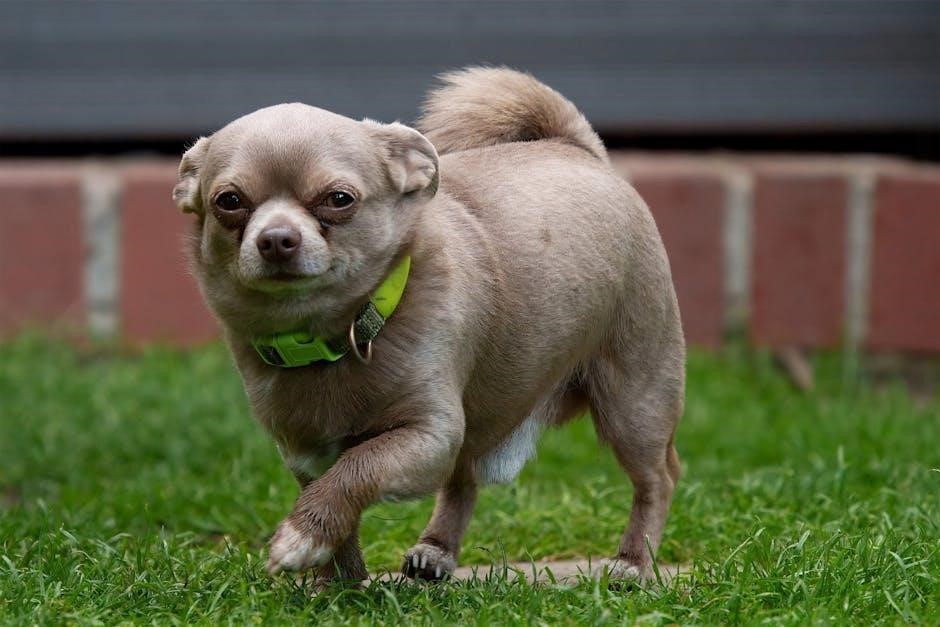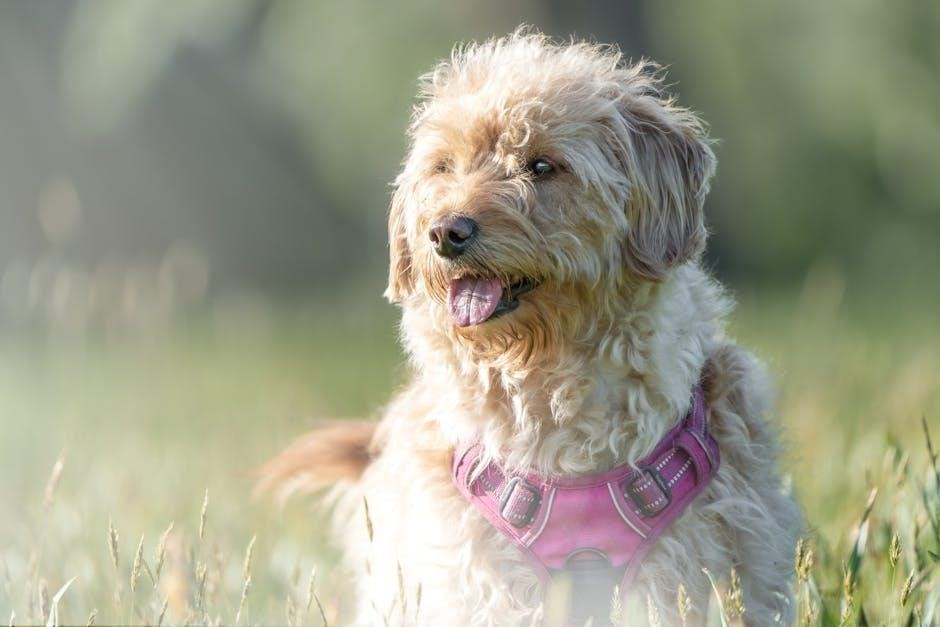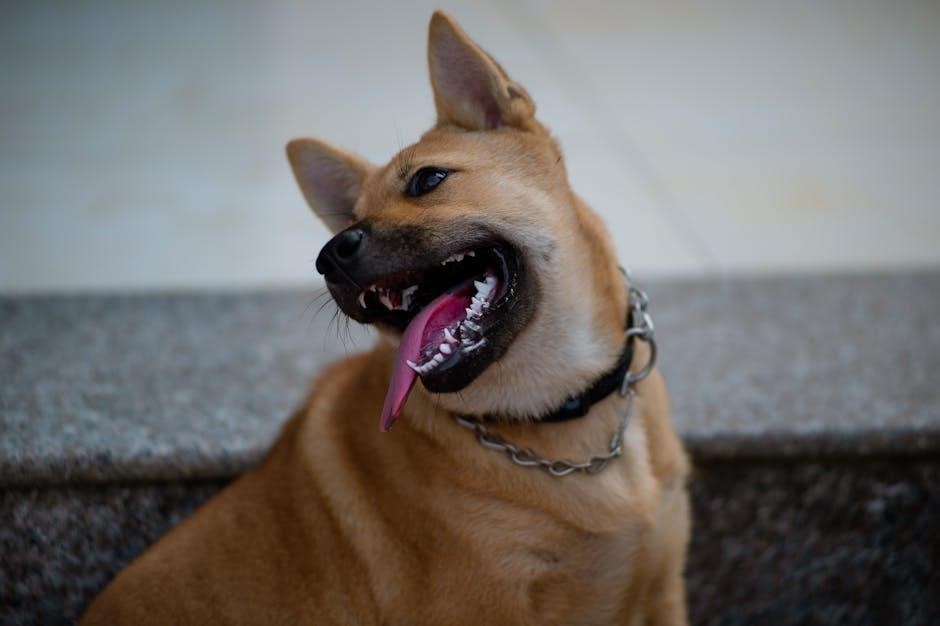
Guide dog puppy raisers are dedicated volunteers who nurture and train future service dogs, providing essential care and socialization․ This role offers personal fulfillment and emotional rewards, contributing to the independence of individuals with visual impairments, though it typically involves no monetary salary․
What is a Guide Dog Puppy Raiser?

A Guide Dog Puppy Raiser is a volunteer who nurtures and trains a puppy from 6-8 weeks old, teaching basic obedience and socialization skills․ They care for the puppy in their home for 12-16 months, ensuring it’s well-adjusted and prepared for advanced training․ Raisers handle daily care, vaccinations, and introduce puppies to new environments, laying the foundation for the puppy to become a guide dog for someone in need․
The Role and Responsibilities
Guide Dog Puppy Raisers are responsible for nurturing and training puppies from 6-8 weeks old․ They handle daily care, socialization, and basic obedience training․ Raisers ensure puppies are house-trained, exposed to public environments, and taught good behavior․ They follow strict guidelines set by their organization, monitoring health and reporting issues․ This role requires a significant time commitment and emotional dedication, as raisers prepare puppies for advanced training to become guide dogs․
Costs and Expenses Associated with Raising a Guide Dog Puppy
Raising a guide dog puppy involves various expenses, including food, toys, and grooming․ While organizations often cover veterinary care and basic supplies, personal costs remain․
Financial Commitments for Puppy Raisers
Puppy raisers typically incur personal expenses, such as food and grooming, while organizations cover veterinary costs and essential supplies․ This financial contribution demonstrates dedication to the cause․
Coverage of Veterinary and Training Expenses

Organizations usually cover veterinary costs, including vaccinations and spay/neuter procedures, as well as training expenses․ Puppy raisers often receive basic supplies like crates and vests, though food is typically not covered․

Are Guide Dog Puppy Raisers Salaried or Volunteers?
Guide dog puppy raisers are typically unpaid volunteers․ Their compensation lies in the emotional rewards of contributing to a greater cause․
Understanding the Compensation Structure
Guide dog puppy raisers are not salaried employees but volunteers․ Their compensation comes in the form of personal fulfillment and the knowledge of contributing to a life-changing cause; While organizations often cover veterinary care, vaccinations, and essential supplies, raisers typically incur out-of-pocket expenses for food and miscellaneous costs․ This structure reflects the volunteer nature of the role, emphasizing service over financial gain․
Volunteer Nature of the Role
The role of a guide dog puppy raiser is entirely voluntary, driven by compassion and dedication․ Volunteers commit time, effort, and resources to care for puppies, knowing their work directly impacts someone’s independence․ While organizations cover some expenses, raisers often contribute personally, finding reward in the journey and outcome rather than financial compensation․ This selfless commitment underscores the heart of the program’s success and sustainability․

Expenses Typically Covered by Organizations
Organizations often cover veterinary bills, vaccinations, spay/neuter costs, and essential supplies like crates, vests, and toys, but rarely food, supporting raisers in their noble endeavor․
Veterinary Care and Vaccinations
Organizations usually cover all essential veterinary expenses, including routine vaccinations, spay/neuter procedures, and preventive care like flea and heartworm treatments․ Puppy raisers are responsible for maintaining the puppy’s health and promptly reporting any medical issues to their coordinators․ This ensures the puppy receives proper care, minimizing out-of-pocket costs for the raiser while prioritizing the puppy’s well-being and training success․
Supplies and Equipment Provided
Most organizations provide basic supplies and equipment to puppy raisers, such as crates, vests, leashes, and toys, to support the puppy’s training and well-being․ These items are essential for socialization and obedience training, ensuring the puppy is properly equipped from an early age․ However, raisers may need to cover additional costs for items like high-quality food and grooming tools, which are typically not provided by the organization․
Comparison of Different Organizations’ Policies
Organizations vary in their financial support for puppy raisers․ Some cover vet bills and supplies, while others may offer additional benefits, but few cover food costs․
Variations in Financial Support Across Organizations
Financial support for puppy raisers differs significantly between organizations․ Some cover all veterinary expenses, vaccinations, and essential supplies like crates and vests․ However, few organizations reimburse for food, which remains an out-of-pocket expense for raisers․ Additionally, while some groups may provide training materials, others expect raisers to handle miscellaneous costs, highlighting the importance of understanding each organization’s policies before committing to the role․
How Different Groups Handle Puppy Raiser Expenses
Organizations vary in how they manage puppy raiser expenses․ Some cover all veterinary costs, vaccinations, and provide essential supplies like crates and vests․ However, food and miscellaneous expenses often remain the raiser’s responsibility․ While some groups offer reimbursement for specific items, others rely on raisers to cover these costs outright․ This variability underscores the importance of understanding an organization’s financial policies before committing to raising a guide dog puppy․
Out-of-Pocket Expenses for Puppy Raisers
While organizations cover vet bills and supplies, puppy raisers often incur personal costs for food, toys, and daily expenses, highlighting the financial investment beyond time and effort․
Food and Miscellaneous Costs
Puppy raisers typically cover food expenses, which can range from $50 to $75 per month, depending on the puppy’s size and breed․ Miscellaneous costs include toys, treats, and grooming supplies, adding up to around $30 monthly․ These expenses, while not reimbursed by most organizations, are essential for the puppy’s health and development, showcasing the financial commitment involved in raising a future guide dog․
Personal Time and Effort Investment
Raising a guide dog puppy requires a significant investment of personal time and effort․ Volunteers dedicate 12-16 months to training, socialization, and daily care․ Emotional attachment often develops, making the eventual separation challenging․ The role demands balancing personal life with the puppy’s needs, ensuring proper development․ While unpaid, the fulfillment comes from knowing the puppy will enhance someone’s independence, making the effort deeply rewarding and impactful․

Application and Training Process
Becoming a guide dog puppy raiser involves an application process, approval, and participation in training programs․ Volunteers learn to care for and train puppies effectively, preparing them for their future roles as service animals․
How to Become a Guide Dog Puppy Raiser
Becoming a guide dog puppy raiser begins with submitting an application to a recognized organization․ Applicants undergo an approval process, including interviews and home visits, to ensure suitability․ Once approved, volunteers participate in training sessions to learn puppy care and handling techniques․ Organizations provide ongoing support, including resources and guidance, to help raisers successfully prepare puppies for their future roles as service animals․
Training Provided to Puppy Raisers

Organizations provide comprehensive training for puppy raisers, covering basic dog care, obedience, and socialization techniques․ Volunteers learn how to introduce puppies to new environments and handle behavioral challenges․ Training sessions and resources are offered to ensure raisers are well-equipped to prepare puppies for their future roles as guide dogs, fostering a strong foundation for success․

Responsibilities of a Puppy Raiser
Puppy raisers provide daily care, socialization, and basic training to future guide dogs, ensuring they adapt to various environments and develop good behavior for their future roles․
Daily Care and Socialization
Daily care involves feeding, grooming, and ensuring the puppy’s health․ Socialization requires exposing the puppy to various environments, people, and experiences to prepare them for future guide dog responsibilities․ This includes training in public spaces, introducing new sounds, and fostering calm behavior in diverse situations․ These efforts lay the foundation for the puppy’s success as a guide dog, though expenses like food are often not covered by organizations;
Training and Behavioral Development
Training focuses on teaching obedience, basic commands, and proper behavior․ Puppy raisers attend classes and work on socialization to help the puppy adapt to public environments․ Behavioral development includes desensitizing the puppy to distractions and ensuring calm, focused behavior․ Organizations provide guidelines and support, but expenses like food often remain the raiser’s responsibility, emphasizing the volunteer nature of the role;

Emotional Challenges of Being a Puppy Raiser
Raising a guide dog puppy creates strong emotional bonds, making separation difficult when the puppy transitions to formal training․ This process can evoke feelings of loss and emotional strain, despite the rewarding outcome of contributing to someone’s independence․
Attachment and Separation
Raising a guide dog puppy fosters a deep emotional bond, making the eventual separation incredibly challenging․ Puppy raisers often experience sadness and a sense of loss when the puppy transitions to advanced training or its forever home․ Despite the rewarding nature of the role, the emotional detachment required can be difficult, as the raiser must balance their attachment with the puppy’s important purpose․
Challenges in Training and Care
Raising a guide dog puppy presents unique challenges, including balancing the puppy’s needs with daily life․ Time management is crucial, as puppies require consistent training, socialization, and veterinary care․ Financial responsibilities, such as food and supplies not covered by organizations, can add up․ Additionally, the physical and emotional demands of training, including housebreaking and obedience, can be overwhelming for new raisers, requiring patience and dedication to ensure the puppy’s success․
Impact and Benefits Beyond Salary
Contributing to a guide dog’s journey brings immense personal satisfaction and fulfillment, knowing you’re aiding someone’s independence and transforming lives through dedication and care․
Personal Satisfaction and Fulfillment
Raising a guide dog puppy offers profound personal fulfillment․ Volunteers experience joy in nurturing a future service animal, knowing their efforts directly impact someone’s life․ Witnessing the puppy’s growth and eventual role in assisting others creates lasting satisfaction and emotional rewards, enriching the raiser’s life in meaningful ways beyond any financial compensation․

Contributing to Someone’s Independence
Raising a guide dog puppy is a direct contribution to empowering individuals with visual impairments․ By nurturing and training these dogs, raisers enable future service animals to provide independence and mobility․ This selfless act creates a lasting impact, transforming lives and fostering autonomy for those in need, making the raiser’s role incredibly rewarding and purposeful․
Guide dog puppy raisers, though unpaid, gain immense fulfillment from their role․ Their dedication directly impacts lives, providing independence and mobility, making their contribution truly invaluable and meaningful․
Guide dog puppy raisers are typically volunteers, receiving no salary but gaining emotional rewards․ Organizations cover veterinary care, supplies, and training, while raisers often incur personal costs like food and time․ The role offers fulfillment through contributing to independence, forming strong bonds with puppies, and knowing their effort changes lives, making the experience deeply rewarding beyond financial compensation․
Final Thoughts on the Role
Becoming a guide dog puppy raiser is a deeply rewarding experience, offering personal growth and emotional fulfillment․ While the role is unpaid, the joy of contributing to someone’s independence far outweighs financial gain․ Raisers receive support from organizations, covering essential expenses, allowing them to focus on nurturing and training․ The bond formed with the puppy and the knowledge of their life-changing impact create a lasting, meaningful legacy․